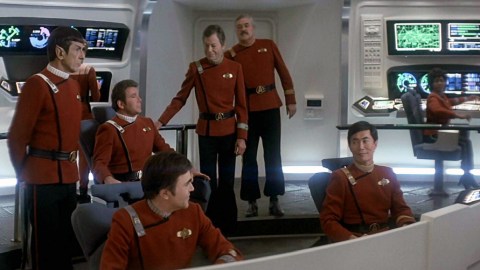The Original Star Trek is Still Driving Innovation at Apple and Google

When George Takei visited us last month, we were fascinated with his explanation of Star Trek’s influence on the social progress and emerging technologies of today. Series creator Gene Roddenberry was a visionary figure in so many ways that 50 years later we’re still trying to turn his dreams into reality.
Farhad Manjoo covers Star Trek tech-made-incarnate in this piece for The New York Times, commenting on major improvements to the Siri software for the iPhone 6s and 6s Plus. The new Siri is hands free; you can access it via voice at any time. Its capabilities have been boosted to the point where we’re awfully close to what Captain Kirk is able to do in the video below.
“The Star Trek computer is not just a metaphor that we use to explain to others what we’re building,” Amit Singhal, the head of Google’s search team, told Manjoo. “It is the ideal that we’re aiming to build — the ideal version done realistically.”
After all, isn’t the advent of Apple’s Siri just an excuse to make us all like Captain Kirk?
A couple years ago, Slate’s Manjoo covered Google’s continued obsession with building the real-life Star Trek computer. Google’s engineers and technicians treat their ambition as more than merely fanboy pursuit; the Star Trek computer is the goal in and of itself, the shining ideal for the future of search. Roddenberry was either some sort of tech Nostradamus or an incredibly keen analyst of computing’s potential.
“The Star Trek computer is not just a metaphor that we use to explain to others what we’re building. It is the ideal that we’re aiming to build — the ideal version done realistically.”
Manjoo calls this “ambient computing,” detailing how in the future voice will become the main mode of communication between us and our machines. It’s a future in which “robotic assistants are always on hand to answer questions, take notes, take orders, or otherwise function as auxiliary brains to whom you might offload many of your chores.”
So, basically, the Star Trek computer.
Takei digs into Roddenberry’s impact on fancy new tech at about the 4:00 mark in this video:
—
Robert Montenegro is a writer, playwright, and dramaturg who lives in Washington DC. His beats include the following: tech, history, sports, geography, culture, and whatever Elon Musk has said on Twitter over the past couple days. He is a graduate of Loyola Marymount University in Los Angeles. You can follow him on Twitter at @Monteneggroll and visit his po’dunk website at robertmontenegro.com.
Read more at The New York Times
Photo courtesy of Paramount Pictures





